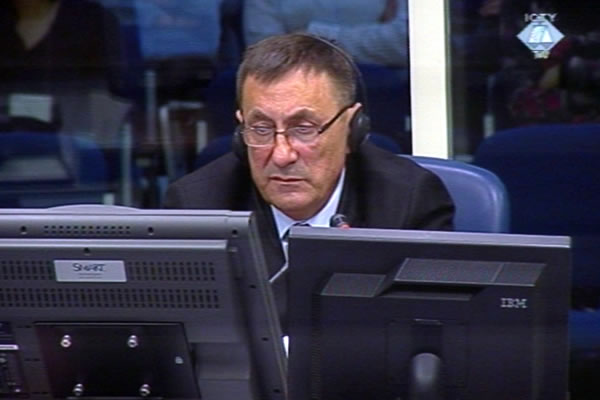Home
DAYTON WAS TAILORED TO BOLSTER WAR GAINS
Despite the prosecution’s evidence about violence against Muslims in Sokolac, the municipal president Milovan Bjelica contends that during the war Muslims left ‘voluntarily’ as part of a ‘natural process’. As for Bjelica, the view he had advocated, that the ethnic communities in BH couldn’t live together but only ‘side by side’, was enshrined in the Dayton agreement
 Milovan Bjelica, defence witness of Radovan Karadzic
Milovan Bjelica, defence witness of Radovan Karadzic Radovan Karadzic’s defense witnesses have all striven to deny the existence of documents known as Variants A and B. The prosecution alleges that by December 1991, the Serb Democratic Party had already envisaged two models for the forcible takeover of power in municipalities. The choice of a model for each municipality depended on whether the Serbs constituted a majority or were in the minority. A number of minutes from the Bosnian Serb Assembly sessions and meetings of other party and ‘state’ bodies that speak about Variants A and B have been admitted into evidence as prosecution exhibits. Milovan Bjelica Cicko, who served in the government of Sokolac municipality during the war, contends that a group of retired JNA officers drafted the document and distributed it ‘without consulting anyone’ to Serb municipal authorities.
Prosecutor Gustafson asked Bjelica where he got that information. Bjelica explained that as he prepared for his testimony at the trial of Momcilo Krajisnik, he asked his associates and other people from the party, because he felt it was ‘the responsible thing to do’, he explained. Bjelica said that he learned from former defense minister Bogdan Subotic that the document had been drafted by retirees. This prompted Judge Kwon to ask Bjelica if he ‘as a responsible man’ asked who the retirees were and how many of them there were. The witness said he had not.
In his statement to the defense team Bjelica claimed that during and after the war Muslims voluntarily left Sokolac describing their transfer from 1994 and 1995. The prosecutor put it to him that most Muslims left the municipality in the first months of the war. By the end of 1992, only 30 to 40 Muslim families remained. According to the prosecution evidence, Muslims left because of the constant pressure and violence: they were detained in prison camps, made to do forced labor, their property was damaged and there were several mass murders. Bjelica agreed that most of the Muslims left in 1992 but remained adamant that the Muslims’ departure was a consequence of ‘a natural process’.
The witness said in his statement to the defense that there were no detention facilities for civilians in Sokolac. There were only military prisons, used for the detention of Muslims charged with terrorism, Bjelica claimed. The prosecutor noted that the detainees included Sema Mujanovic, who was 62 at the time. She had been taken with other women and men from the village of Sehovici and detained in the local primary school. ‘I don’t know, women also carried arms and fought’, the current president of Sokolac municipality Bjelica replied.
As the witness claimed that Muslims were able to return to their homes after the war, the prosecutor confronted him with the data showing that as of 1997, no Muslim refugees had returned to Sokolac. The witness replied that more people returned after that time. Many Bosniaks live now in Sokolac and they have even voted for him at local elections, Bjelica claimed. However, in an interview in 2004 Bjelica said that Serbs didn’t want to ‘either live or be buried’ next to Bosniaks. The witness didn’t find it strange, explaining what he meant: instead of co-existence he advocated ‘living side by side’. According to Bjelica, that is an achievement of the Dayton agreement. Incidentally, Bjelica was banned from politics by the High Representative in BH from 2003 to 2010. After SFOR arrested him in May 2004, Bjelica spent months in detention in conditions he ‘wouldn’t wish on anyone’.
Karadzic’s trail continued with the evidence of Gojko Cekic, former commander of the Batkovic prison camp near Bijeljina.
Linked Reports
- Case : Karadzic
- 2013-04-02 GENERAL MILETIC WILL TESTIFY ONLY IF SUBPOENAED
- 2013-04-02 RADOVAN KARADZIC WAS A ‘SUPERIOR BUT VULGAR INTELLECTUAL’
- 2013-03-28 STEALING VW GOLF CARS MORE IMPORTANT THAN CRIMES AGAINST CIVILIANS
- 2013-04-04 ORIC WILL NOT ‘DEFEND’ KARADZIC
- 2013-04-04 PERFECT HARMONY AT KARADZIC TRIAL
- 2013-04-05 ‘PSYCHOPATHS AND BULLIES’ COMMITTED CRIMES
